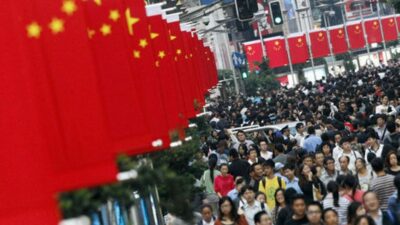>>REAL-TIME UPDATES IN THE WIRE. CLICK HERE<<<
China set a growth target of “around 5%” for 2024 and pledged to take steps to transform the development model and defuse risks fuelled by property developers and indebted cities, according to the Government Work Report delivered by Premier Li Qiang at the annual session of the National People’s Congress on Tuesday.
China will run a budget deficit of 3% of economic output, down from a revised 3.8% last year, the report said.
The government plans to issue 1 trillion yuan ($139 billion) in special treasury bonds and the quota for local government special-purpose bond issuance quota is set at 3.9 trillion yuan, compared to 3.8 trillion yuan in 2023, according to the report.
This year, China plans to target an urban unemployment rate of around 5.5%, the creation of 12 million new urban jobs and a consumer price index increase of around 3%. The 2024 targets were the same as those set for 2023.
China will issue ultra-long-term special treasury bonds for several years ahead to systematically address the issue of financing the construction of major projects, particularly for the implementation of the country’s major strategies and strengthening security in key areas, with the first issuance of 1 trillion yuan this year, said Li.
It should be noted that Chinese economy is facing difficulties and challenges and the external environment is becoming increasingly complicated and severe with rising uncertainties, said Li.
The foundation of China’s economic recovery is not solid yet, domestic demand is insufficient, social expectations relatively weak and there remains many risks, he said, noting that some small- and medium-sized companies’ operations are facing difficulties and employment situation is facing pressure and structural issues.
Li vowed thatChina will transform its development model, curb industrial overcapacity, defuse real estate sector risks and cut wasteful spending by local governments.
“We should not lose sight of worst-case scenarios and should be well prepared for all risks and challenges,” Li said. “In particular, we must push ahead with transforming the growth model, making structural adjustments, improving quality, and enhancing performance.”
In setting the growth target, policymakers “have taken into account the need to boost employment and incomes and prevent and defuse risks,” Li said, adding China intended to have a “proactive” fiscal stance and “prudent” monetary policy.
China will continue to pour resources into tech innovation and advanced manufacturing, in line with President Xi Jinping’s push for “new productive forces,” Li said.
Last year China’s economy grew by 5.2%, matching the official target of around 5%. The overall rebound from the pandemic was slower than many expected, while growth also faced drags from a slump in real estate and exports.
In 2023, the National Bureau of Statistics said the country averaged a 5.2% unemployment rate in cities and created 12.44 million jobs. However, the consumer price index rose by 0.2% amid lackluster demand.
The work report emphasized the need to “ensure both high-quality development and greater security,” preventing risks and maintaining social stability, among other tasks.
China pledged to improve the long-term mechanisms for preventing and controlling risks.
“We will implement a package of measures to defuse risks caused by existing debts and guard against risks arising from new debts,” Beijing said in the work report. “We will take prudent steps to defuse risks in small and medium financial institutions in some localities and take tough measures against illegal financial activities.”
China also pledged to “meet justified financing demands of real estate enterprises under various forms of ownership on an equal basis” and “make concerted efforts to defuse local government debt risks while ensuring stable development.”
“Preventing and defusing risks in certain fields remain a challenging task,” China’s top economic planning agency National Development and Reform Commission said in its annual work report.
“Hidden risks, such as debt-related risks and financial risks, are still prominent in some localities, and it takes time to foster a new model of development for the real estate sector.”

